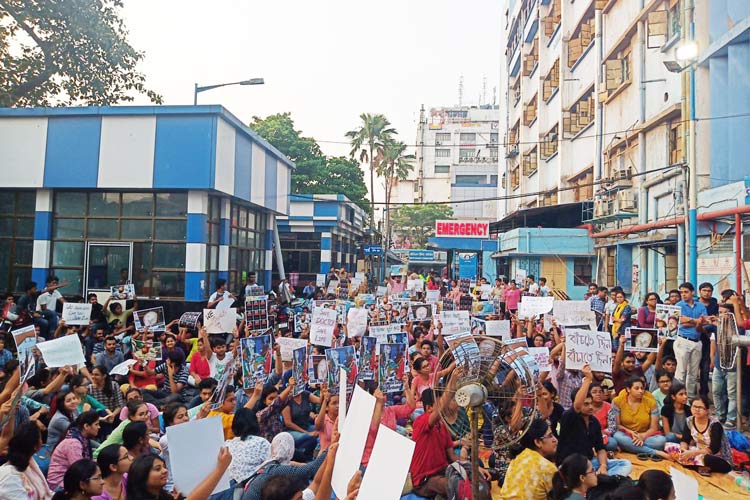The Supreme Court’s directive for the agitating junior doctors of RR Kar Hospital to return to work by Monday, September 10, at 6 pm, has been met with resistance. This resistance is not an act of defiance against the apex court but a justified stance rooted in genuine fear and frustration. The junior doctors are not demanding the moon; they are asking for basic safety and justice for their young colleague who was brutally gang-raped and murdered. Their demands are both legitimate and imperative, given the grim circumstances they are facing. The core of their agitation revolves around five straightforward demands, primarily calling for justice for their colleague and foolproof protection for women doctors on night duty, especially those attending emergency cases. These demands are not just logical but crucial. In a state where the accused include none other than the Chief Minister, who simultaneously holds the Health and Home Ministries, there is a glaring conflict of interest. How can justice be expected when the very person responsible for ensuring law and order is implicated in the crime? The Supreme Court’s insistence on the doctors returning to work overlooks a critical reality—their safety cannot be guaranteed if they adhere to the court’s advice. The vindictive nature of the current administration, led by a Chief Minister embroiled in controversy, presents a credible threat to those who have taken to the streets to protest against this heinous crime. Who is to assure these doctors that they won’t be targeted or harassed upon their return to duty?
The state government’s handling of the case has been nothing short of a mockery of justice. Despite the Supreme Court’s scrutiny, the state’s response has been alarmingly inadequate. The latest status report filed by the state government and the central investigative agency only reinforces the perception of a cover-up. The state government’s failure to produce a vital “challan” at the time of recording the death of the junior doctor has drawn the ire of the three-member bench led by Chief Justice DY Chandrachud. This “missing” document raises serious questions about the state’s intentions and competence. How can a crucial piece of evidence simply vanish? Moreover, the state police’s handling of the initial investigation reeks of incompetence or, worse, intentional sabotage. Despite it being a medico-legal case, the post-mortem and cremation were hurriedly disposed of, while the hospital management rushed to renovate the site even before the case could reach a conclusion. Adding to the suspicion, a 7,000-strong mob was allowed to raid the hospital on the night of August 14, meticulously destroying whatever evidence was left at the scene of the crime. The mob did not spare even the ICU wards, beating up the peacefully agitating doctors. This deliberate act was clearly intended to create fear among those questioning the government’s and hospital authorities’ failures. The state police have been accused of providing the Central Bureau of Investigation (CBI) with piecemeal evidence, conveniently missing critical sequences captured on CCTV near the incident spot. Such lapses suggest an active effort to obfuscate the truth. The state’s reluctance to hand over the case to the CBI until the High Court intervened further casts doubt on its integrity. Evidence at the crime scene was reportedly destroyed under the noses of state police and health ministry officials. A note, now in possession of a leading English news channel, clearly points fingers at the health department’s higher-ups. The note, signed by the Principal Secretary of Health—who directly reports to the Chief Minister—has not been brought up in court, raising further suspicions. Why hasn’t this critical piece of evidence, potentially a game-changer, been scrutinized?
The apex court, while genuinely concerned about the ongoing agitation disrupting healthcare services in West Bengal, must consider the bigger picture. The agitation is not just a disruption; it’s a desperate cry for justice and safety in an environment where both are glaringly absent. The court’s concern is understandable, but it should not overlook the fact that the Chief Minister, who also serves as the state’s health minister, must be held accountable. Her continued presence in office undermines any effort to deliver justice and ensures a fair and impartial investigation. The central question remains: Should the court penalize junior doctors for refusing to return to work when they genuinely fear retaliation from a government led by the very person accused of being complicit in this crime? How can the court expect these young professionals to trust an administration that has repeatedly shown its contempt for transparency and justice? The Chief Minister’s recent statement urging agitating doctors to return to work, citing the upcoming puja days, reflects a disturbing lack of empathy. It reeks of insensitivity and a dismissive attitude towards the gravity of the situation. How can anyone take her assurances seriously when her government has been nothing but obstructive and opaque? Thus far, the junior doctors’ agitation at RR Kar Hospital is not a defiance of the Supreme Court’s directive but a legitimate stand against a corrupt and potentially dangerous administration. Until there is a change at the top, with the Chief Minister and her health ministerial role being relinquished, there can be no guarantee of justice or safety for the doctors. The Supreme Court must take a broader view of the situation and ensure that those in power are not allowed to manipulate justice while the victims and their advocates are left vulnerable. The fight is not just for justice for one; it is for the safety and integrity of all who serve selflessly in the line of duty.






